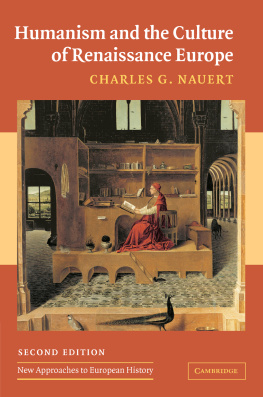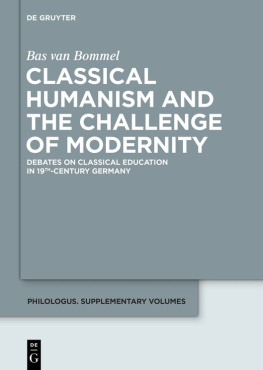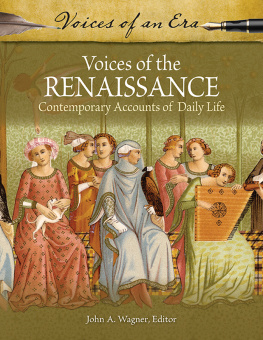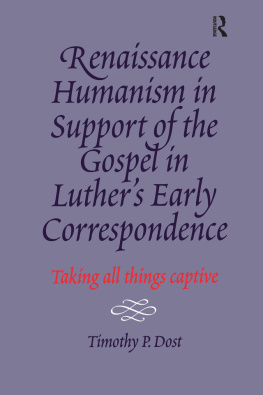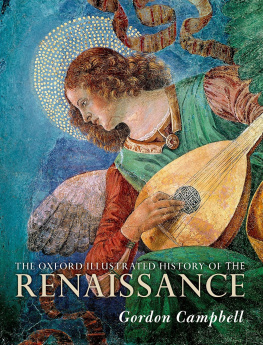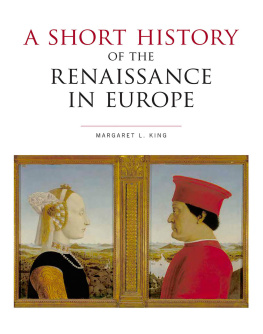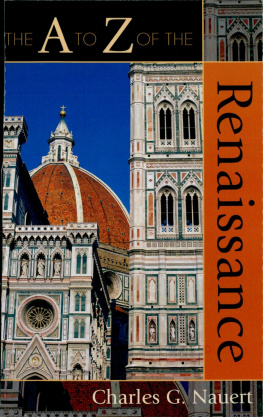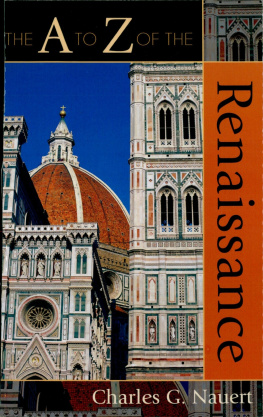Nauert - Humanism and the Culture of Renaissance Europe
Here you can read online Nauert - Humanism and the Culture of Renaissance Europe full text of the book (entire story) in english for free. Download pdf and epub, get meaning, cover and reviews about this ebook. year: 1995, publisher: Cambridge Univ Press, genre: Religion. Description of the work, (preface) as well as reviews are available. Best literature library LitArk.com created for fans of good reading and offers a wide selection of genres:
Romance novel
Science fiction
Adventure
Detective
Science
History
Home and family
Prose
Art
Politics
Computer
Non-fiction
Religion
Business
Children
Humor
Choose a favorite category and find really read worthwhile books. Enjoy immersion in the world of imagination, feel the emotions of the characters or learn something new for yourself, make an fascinating discovery.
Humanism and the Culture of Renaissance Europe: summary, description and annotation
We offer to read an annotation, description, summary or preface (depends on what the author of the book "Humanism and the Culture of Renaissance Europe" wrote himself). If you haven't found the necessary information about the book — write in the comments, we will try to find it.
Nauert: author's other books
Who wrote Humanism and the Culture of Renaissance Europe? Find out the surname, the name of the author of the book and a list of all author's works by series.
Humanism and the Culture of Renaissance Europe — read online for free the complete book (whole text) full work
Below is the text of the book, divided by pages. System saving the place of the last page read, allows you to conveniently read the book "Humanism and the Culture of Renaissance Europe" online for free, without having to search again every time where you left off. Put a bookmark, and you can go to the page where you finished reading at any time.
Font size:
Interval:
Bookmark:
Humanism and the Culture of Renaissance Europe
In this updated edition of his classic account, Charles Nauert charts the rise of humanism as the distinctive culture of the social, political, and intellectual elites in Renaissance Europe. He traces humanisms emergence in the unique social and cultural conditions of fourteenth-century Italy and its gradual diffusion throughout the rest of Europe from the late fifteenth century onwards. He shows how, despite its elitist origins, humanism became a major force in the popular culture and fine arts of the fifteenth and sixteenth centuries, and the powerful impact it had on the Protestant and Catholic Reformations. He uses art and biographical sketches of key figures to illuminate the narrative and concludes with an account of the limitations and eventual transformations of humanism at the end of the Renaissance. This comprehensive account of the development and significance of humanistic culture will be essential reading for all students of Renaissance Europe.
CHARLES G. NAUERT is Professor Emeritus of History at the University of Missouri, Columbia. His major publications include several essays on pre-Reformation academic and religious controversies and The Age of Renaissance and Reformation (1977).
NEW APPROACHES TO EUROPEAN HISTORY
Series editors
WILLIAM BEIK Emory University
T. C. W. BLANNING Sidney Sussex College, Cambridge

New Approaches to European History is an important textbook series, which provides concise but authoritative surveys of major themes and problems in European history since the Renaissance. Written at a level and length accessible to advanced school students and undergraduates, each book in the series addresses topics or themes that students of European history encounter daily: the series embraces both some of the more traditional subjects of study, and those cultural and social issues to which increasing numbers of school and college courses are devoted. A particular effort is made to consider the wider international implications of the subject under scrutiny.
To aid the student reader scholarly apparatus and annotation is light, but each work has full supplementary bibliographies and notes for further reading: where appropriate chronologies, maps, diagrams and other illustrative material are also provided.
For a list of titles published in the series, please see .
Humanism and the Culture of Renaissance Europe

Second edition
CHARLES G. NAUERT
University of Missouri, Columbia


University Printing House, Cambridge CB2 8BS, United Kingdom
Published in the United States of America by Cambridge University Press, New York
Cambridge University Press is part of the University of Cambridge.
It furthers the Universitys mission by disseminating knowledge in the pursuit of education, learning and research at the highest international levels of excellence.
www.cambridge.org
Information on this title www.cambridge.org/9780521839099
Cambridge University Press 1995, 2006
This publication is in copyright. Subject to statutory exception and to the provisions of relevant collective licensing agreements, no reproduction of any part may take place without the written permission of Cambridge University Press.
First published 1995
Reprinted five times
Second edition 2006
6th printing 2013
Printed in the United Kingdom by the CPI Group Ltd, Croydon CR0 4YY
A catalogue record for this publication is available from the British Library
ISBN 978-0-521-83909-9 Hardback
ISBN 978-0-521-54781-9 Paperback
Cambridge University Press has no responsibility for the persistence or accuracy of URLs for external or third-party internet websites, referred to tin this publication, and does not guarantee that any content on such websites is, or will remain, accurate or appropriate. Information regarding prices, travel timetables and other factual information given in this work, are correct at the time of first printing but Cambridge University Press does not guarantee the accuracy of such information thereafter.
Contents

Illustrations

Preface

This book aims to present a comprehensive account of the development and significance of the humanistic culture of Europe (north as well as south) in the age of the Renaissance. It is based on the researches of more than a generation of scholars active since about the end of the Second World War. At that time, critical attacks on the traditional picture of Renaissance civilization established by Jakob Burckhardt had produced so much doubt about the meaning, and even the existence, of a Renaissance that many historians abandoned use of the term itself, a situation brilliantly demonstrated in Wallace K. Fergusons The Renaissance in Historical Thought (1948). In the aftermath of that historiographical demolition, I myself wrote a dissertation which systematically avoided use of the dread term Renaissance, and not a single member of my examining committee challenged or even mentioned the omission. Yet leaving the Renaissance and humanism out of the history of the Renaissance age was not a viable position, as I found when I undertook to revise my dissertation into a book that addressed the intellectual problems of the sixteenth century, and found in an even more pressing way when I faced the task of explaining the Renaissance to a class of college freshmen in a lecture of fifty minutes. Whether historians like the concepts Renaissance and humanism or not, the centuries to which those terms are conventionally applied really did exist and must be faced, since they contributed in important ways to the subsequent development of Western society and civilization.
In my teaching and in preparing this book, I have had the guidance of a host of scholars who have gone back to the sources and have created the materials out of which one can derive a credible account of the rise of humanistic culture and its historical significance. In my own thinking about the age, the crucial influences have been a handful of stimulating articles by Theodor E. Mommsen, whom I never met, and the publications and personal encouragement of Hans Baron, Paul Oskar Kristeller, and my own mentor, William J. Bouwsma. To go beyond this short list would be invidious, for I have learned from a whole generation of colleagues. Most of their names appear in the Bibliography, and I can only hope that I had the good sense to make constructive use of what their publications offer.
I owe special thanks to my colleagues in the Department of History at the University of Missouri-Columbia, especially for enabling me to have a year free from teaching to work on this book. I dedicate this book with love and thanks to my wife Jean and our sons Paul and Jon.
Next pageFont size:
Interval:
Bookmark:
Similar books «Humanism and the Culture of Renaissance Europe»
Look at similar books to Humanism and the Culture of Renaissance Europe. We have selected literature similar in name and meaning in the hope of providing readers with more options to find new, interesting, not yet read works.
Discussion, reviews of the book Humanism and the Culture of Renaissance Europe and just readers' own opinions. Leave your comments, write what you think about the work, its meaning or the main characters. Specify what exactly you liked and what you didn't like, and why you think so.

